AI Robots Set to Inspect Buildings and Safeguard Against Structural Failures
Robot Talk Episode 102 – Isabella Fiorello

Claire chatted to Isabella Fiorello from the University of Freiburg about plant-inspired robots made from living materials.
Isabella Fiorello is a Junior Group Leader and Principal Investigator of the Bioinspired Plant-hybrid Materials group at the University of Freiburg in Germany. She has a Master’s Degree in Industrial Biotechnology from the University of Turin in Italy and a PhD in Biorobotics from Scuola Superiore Sant’Anna in Italy. Her research focusses on the development of biologically-inspired microfabricated living materials able to precisely interact with complex unstructured surfaces for applications in precision agriculture, smart fabrics, space, and soft robotics.
Best 10+ Grocery Delivery Apps In The USA 2025
Best 10+ Grocery Delivery Apps in The USA 2025
The online delivery businesses, especially during the post corona pandemic have witnessed tremendous growth. Supermarkets or e-commerce players are engaged in delivering groceries, kitchen essentials, home essentials, and all personal care products directly to the doorsteps of the customers.
On top of all, grocery apps have created a trend across the global markets. Grocery mobile apps never compromised on user comfort and convenience. These apps are helping people to order fresh groceries online and get them instantly within 30 minutes.
Driven by the people switching to safe and convenient door delivery services, the demand for online grocery delivery apps across the world has crossed the sky limit. This trend is giving wide opportunities for Grocery delivery application development for Android and iPhone.
Though thousands of grocery apps are available in the Google Play Store and Android App Store, Grocery Delivery App Development is still a hot topic in the industry and heading towards a success milestone.
Today, we would like to talk about a few best grocery delivery apps (Android & iOS) in the USA. These food and grocery delivery apps reported a million downloads and have helped the citizens of America a lot during the nerve-racking pandemic.
If you are looking ahead to developing grocery apps or food delivery apps, you can clone any of the below-listed apps for tasting the successful results as soon as your app was launched.
Let’s get started!
Top 10 Grocery Delivery Apps in The USA
#1. Walmart- The largest online grocery delivery apps in the USA
Walmart is an American–based multinational online retailer. As of 2021, the app has been downloaded by nearly 50 million times from Google Play Store. And, approximately ten million times it has been downloaded by iPhone users.
This one-stop online shopping app has ranked as the fourth largest US top shopping app beyond Amazon, Shein, and Shop. In terms of grocery delivery services, it is leading the industry with its reliable, faster, easier, committed, safe and secure deliveries.
Users can order groceries, household essentials, and millions of other products from favorite and popular brands from the comfort of their places.
#2. Kroger- Most popular grocery shopping & delivery apps in USA
Kroger is the best online grocery delivery app in the USA, which is available for Android and iPhone. It offers the hottest coupons, deals, discounts, and other promotional offers to customers and optimizes its ranking in the USA’s online delivery industry.
From fresh vegetables, foodstuffs, pulses and spices, and frozen food to pre-packaged household goods, healthcare products, baby care products, beauty care products, pet care products, personal care products, and bakery and confectionery items, Kroger delivers everything.
The app gives the flexibility to users to shop online or offline and opt for pickup goods or door delivery. This concept also made Kroger the best online iOS app and Android grocery delivery application in the USA.
Secure and convenient in-app payments, in-app scanning facility, and order tracking facility are some user-friendly features of Kroger-like most-downloaded grocery app in America.
This popular grocery delivery app in America has been given a 4.8/5 star rating from over 1 million iPhone users. On the other side, the app is also featured on Google Play Store and given a 4.5/5 star rating by nearly 10 million users.
Recommend To Read: How Can You Reshape Your Traditional E-commerce Business With AI?
#3. Instacart- The Best Grocery Delivery Application In The USA for Android and iOS
Instacart is a leading American grocery delivery app that operates across the USA and Canadian locations. It is giving stiff competition to Kroger in the USA. This famous online retailer has partnered with over 600 supermarkets and other retailers to ensure smooth services to its audience.
It is best useful for ordering groceries, fresh food, chilled beverages, snacks, alcohol, and many more products online from their favorite stores and getting them all at doorsteps in as fast as one hour.
One of the best features of the Instacart online delivery app is it offers same-day delivery or pickup of fresh or preservatives at flexible prices. Like many other on-demand grocery delivery apps, Instacart also gives its users the flexibility of self-pickup or door delivery services.
As of 2021, this San Francisco, California-based trending grocery delivery app has generated $1.8 billion in revenues and has over 9.6 million users.
#4. DoorDash- A Popular Grocery App In The USA
DoorDash is one of the best and top-rated online food delivery apps in San Francisco, California, NYC United States. As of Statista, DoorDash is the most downloaded mobile app for online grocery ordering and delivery in the USA. It has reported nearly 39 million downloads and giving stiff competition to other players in the industry.
It allows users to order food and groceries from nearly thousands of nearby local supermarkets and restaurants across the USA, Canada, and Australia.
This on-demand grocery delivery application (Android & iOS) in the USA is popularizing with its user-friendly features that allow users to search for restaurants or supermarkets easier and order items faster. The app’s “Takeaway” or Pick up feature will enable users to order from home and collect and pick up their products in minutes.
Are you looking to hire the best grocery delivery app development company USA?
[contact-form-7]#5. Amazon Prime Now- Top Online Grocery Delivery Application For Android and iPhone
Amazon Prime Now is a free-to-downloadable grocery delivery app that is one of the top listed mobile applications in the USA. Millions of downloads, active users, and super excelling app performance made it one of the biggest on-demand delivery apps for android and iOS.
It’s simple UI and easy-to-access features are success stones for the Amazon Prime Now grocery shopping app. From electronics to groceries, users can order from favorite local grocery shops and retailers and get delivered to their doorstep within 2 hours.
Search local supermarkets/stores, hassle-free checkout, quick order, exclusive deals and promos, express delivery, scheduled delivery, real-time order tracking, easy return policy, and in-app card/wallet payments are a few user-friendly features of this popular USA-based grocery app.
Accordingly, Google Shopping, Shipt, delivery.com, 7Now, Imperfect Foods, Dumpling, Postmates, and CheckOut51 are other popular grocery delivery apps in the USA.
Build A Grocery Delivery App Like Walmart and InstaCart and grab the market opportunities.
[contact-form-7]
What Features and Functionalities Will Make Your Grocery App Successful?
We have discussed a few USA’s best grocery delivery apps for Android and iPhone devices. The core reason behind the success of these applications is their feature set. Yes. User-engaging features and functionalities are assisting these brands to survive competitively in this clone apps world.
Being the best custom mobile app development company in the USA, we have compiled a list of the best features that are required to create an outstanding grocery delivery application.
Must-have Features For Customer Panel
- Quick sign-up and login
- Social media login
- Customized search feature
- Location tracking
- Product Categories
- Customized filters
- High-quality content
- Add To cart
- Wish list
- Smooth Checkout
- Apply Promos or discounts
- In-app payments or COD
- Order tracking
- Order history
- User Profile
- Push Notifications
- Ratings & Review
- Schedule Delivery
- Pickup or Door Delivery
- Manage Cart: To add or remove saved items from cart
- Rewards & Redeems
Must-Have Features To Develop Restaurant Panel
- Simple login
- Upload Products
- Upload promos, discounts, and deals
- Order Accept or Reject
- Status Tracking
- Order History
- Payment Management
These are must-have features that need to be added to your grocery delivery clone apps. You also need to add a few necessary features for developing Admin and Delivery Agent panels.
Must-Have Features To Develop Delivery Agent Panel
- Simple Registration and login
- Accept or reject delivery requests
- Geo location tracking
- Route navigation
- Orders delivered history
- In-app calling or chatting feature
- Payment history
- Reviews and ratings
Must-Have Features To Develop Admin Panel For Grocery Delivery App
- Simple dashboard view
- Orders management
- Retail stores management
- Products management
- Delivery agent management
- Content management
- User profile management
- In-app product or brand promotion campaigns management
- Inventory tracking and management
- Reviews and ratings management
- Deals and discounts management
- Product categories management
- Conversion rates management
USM Business Systems is one of the best grocery delivery app development services providers in the USA. We help supermarkets and retailers to offer fresh Grocery Delivery services to customers.
Get an attractive grocery delivery app development quote!
[contact-form-7]The Estimated Cost Of Grocery Delivery App Development
The cost of on-demand grocery delivery app for Android and iOS in the USA will cost somewhat around $35,000-$150,000. Since the hourly rate of mobile app development companies in India is low as compared to the USA app development companies, the grocery delivery app development cost in India would range from $18,000 to $55,000.
If you are looking to hire the best grocery delivery app development company, then USM is the best custom app development partner for you. Our expert team of app designers and developers will help you in creating an ultimate mobile grocery delivery app at an affordable budget.
Wrapping Up
It is the right to clone app development. Since the above list of grocery delivery apps in the USA is creating a buzz in their niches, creating clone apps is a pretty good strategy. User-friendly grocery app development with advanced in-app tracking and e-wallet payment features will help you boost your online grocery business.
Being the best grocery delivery app development company in the United States, the team of USM’s app developers creates out-of-the-box grocery delivery solutions or multi-vendor grocery apps at affordable budget.
Let’s build a grocery app that beats the clone app traffic in the app stores!
[contact-form-7]
Biden’s Clemency Gambit: Justice Reform or Political Showmanship?
President Joe Biden’s decision to commute the sentences of roughly 1,500 individuals and pardon 39 Americans on December 12, 2024, has drawn criticism as an overtly political move cloaked in the guise of justice reform. While touted as the largest single-day clemency act in modern U.S. history, detractors argue it raises more questions than it...
The post Biden’s Clemency Gambit: Justice Reform or Political Showmanship? appeared first on 1redDrop.
Diversity and inclusion accelerate the pace of innovation in robotics
HP MULTI JET FUSION Helps Campetella Robotic Center Reduce Lead Time and Cost
How diversity and inclusion drive innovation in robotics
Christopher Wray’s Resignation: A Turning Point Amid FBI Controversies
In a significant announcement, FBI Director Christopher Wray declared his intention to resign before the inauguration of President-elect Donald Trump. This decision marks not just the end of Wray’s tenure but potentially the beginning of a new chapter for one of the nation’s most critical institutions. Wray’s Departure: Cutting His Tenure Short Christopher Wray, appointed...
The post Christopher Wray’s Resignation: A Turning Point Amid FBI Controversies appeared first on 1redDrop.
BallBot demonstrates the science behind balance control for robotics
Minuscule robots for targeted drug delivery
Containing the Franklin Fire: Malibu’s Struggle and Resilience
The Franklin Fire, which erupted late Monday night in Malibu, has scorched nearly 4,000 acres of Southern California’s scenic terrain. Amidst red-flag warnings and relentless Santa Ana winds, firefighters are beginning to make headway in containing this devastating blaze. The Rapid Growth of the Franklin Fire Fueled by strong winds and low humidity, the Franklin...
The post Containing the Franklin Fire: Malibu’s Struggle and Resilience appeared first on 1redDrop.
AI apps and agents that scale impact across your business
Despite significant investments in AI, many organizations struggle to convert that potential into compelling business outcomes.
Only a third of AI practitioners feel equipped with the right tools, and deploying predictive AI apps takes an average of seven months—eight for generative AI. Even then, confidence in these solutions is often low, leaving organizations unable to fully capitalize on their AI investments.
By streamlining deployment and empowering teams, the right AI apps and agents can help businesses deliver predictive and generative AI use cases faster and with greater results.
What’s slowing your success with AI applications?
Data science and AI teams often face lengthy cycles, integration hurdles, and inefficient tools, making it difficult to deliver advanced use cases or integrate them into business systems.
Custom fixes may offer a fast workaround, but they often lack scalability, leaving businesses unable to fully unlock AI’s potential. The result? Missed opportunities, fragmented systems, and growing frustration.
To address these challenges, DataRobot’s AI apps and agents help streamline deployment, accelerate timelines, and simplify the delivery of advanced use cases, without the complexity of building from scratch.
AI apps and agents
Delivering impactful AI use cases can be faster and more efficient with custom AI solutions. Specifically, DataRobot’s new features provide:
- Streamlined deployment by reducing the need for extensive code rewrites.
- Pre-built templates for business logic, governance, and user experience to accelerate timelines.
- The ability to tailor approaches to meet your unique organizational needs, ensuring meaningful results.
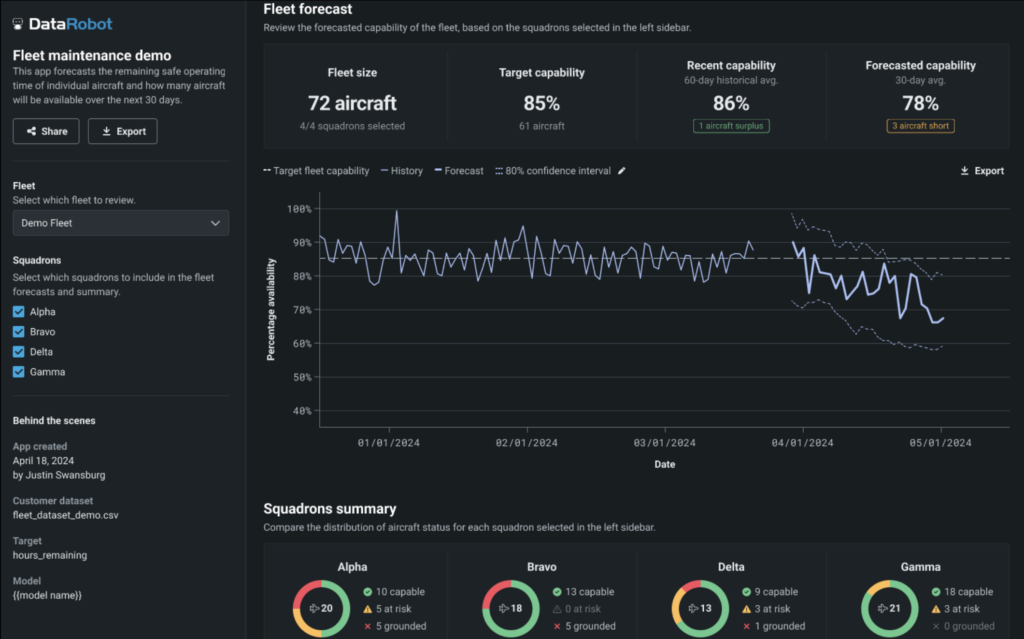
Collaborative AI application library
Disconnected workflows and scattered resources can bring AI deployment to a crawl, stalling progress. DataRobot’s customizable frameworks, hosted on GitHub, help teams establish a shared library of AI applications to:
- Start with a foundational framework.
- Adapt it to organizational requirements.
- Share it across data science, app development, and business teams.
These organization-specific customizations empower teams to deploy faster, enhance security, and foster seamless collaboration across the organization.
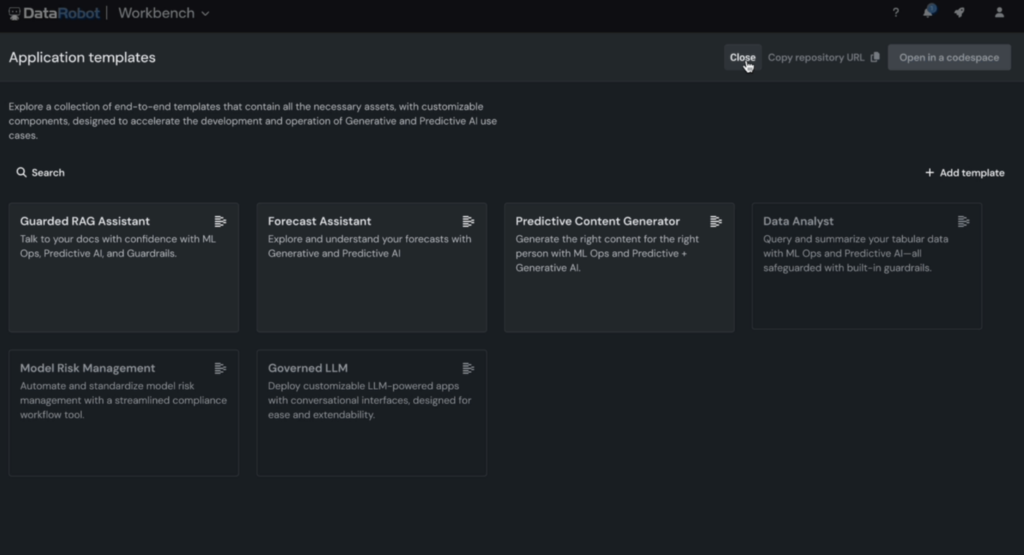
How to streamline fragmented workflows for scalable AI
Creating user-friendly AI interfaces that integrate seamlessly into business workflows is often a slow, complex process. Custom development and integration challenges force teams to start from a blank slate, leading to inefficiencies and delays. Simplifying app development, hosting, and prototyping can accelerate delivery and enable faster integration into business workflows.
AI App Workshop
Setting up local environments and generating Docker images often creates bottlenecks. Managing dependencies, configuring settings, and ensuring compatibility across systems are time-consuming, manual tasks prone to errors and delays.
DataRobot Codespaces now allow you to build code-first AI applications for your models using frameworks like Streamlit and Flask, simplifying development and enabling quick creation and deployment of custom generative AI app interfaces.
The new embedded Codespace support enhances this process by allowing you to easily develop, upload, test, and organize interfaces within a streamlined file system, eliminating common setup challenges.
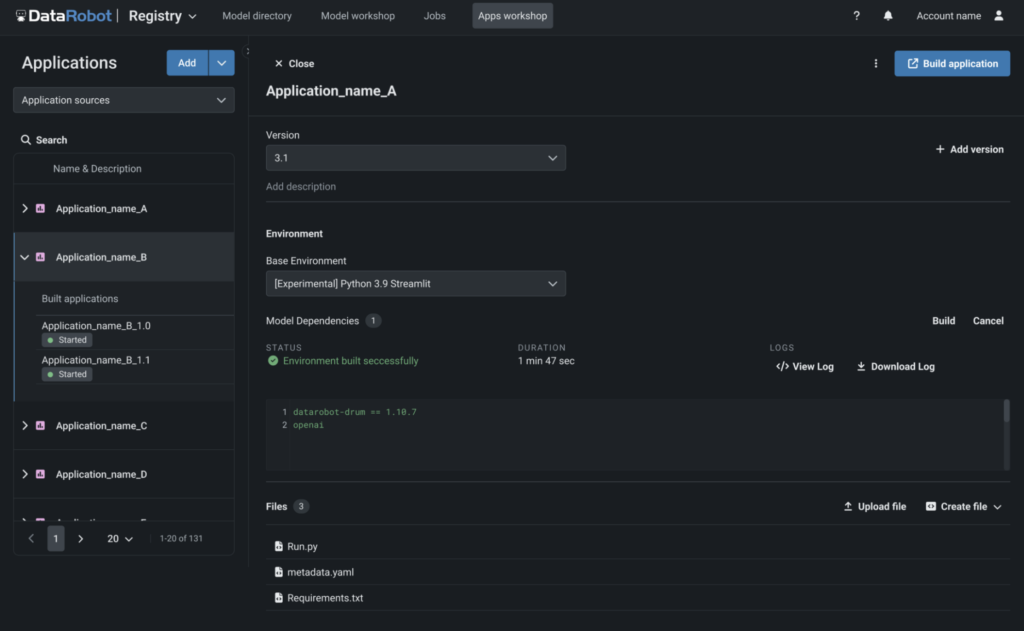
Q&A App
Another new DataRobot feature enables you to quickly create chat applications to prototype, test, and red-team generative AI models. With a simple, pre-built GUI, you can evaluate model performance, gather feedback efficiently, and collaborate with business stakeholders to refine your approach.
This streamlined approach accelerates early development and validation, while its flexibility allows you to customize or replace components as priorities evolve.
Adding custom metrics and conducting stress-testing ensures the application meets organizational needs, builds trust in its responses, and is ready for seamless production deployment.
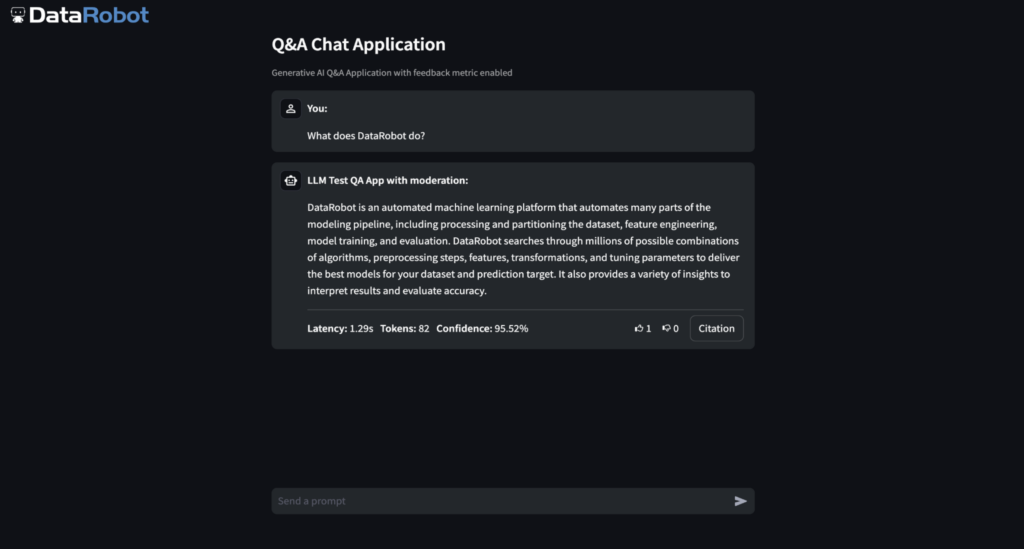
What’s holding back scalable AI applications?
Delivering scalable, trustworthy AI applications requires cohesion across workflows, tools, and teams. Without streamlined provisioning, standardization, and integration, delays and inefficiencies stall progress and stifle innovation.
The right tools, however, unify processes, reduce errors, and align outcomes with business needs.
Declarative API framework
DataRobot’s Declarative API Framework simplifies the development of scalable, repeatable AI applications for generative and predictive use cases, enabling teams to replicate work, save pipelines, and deliver solutions faster.
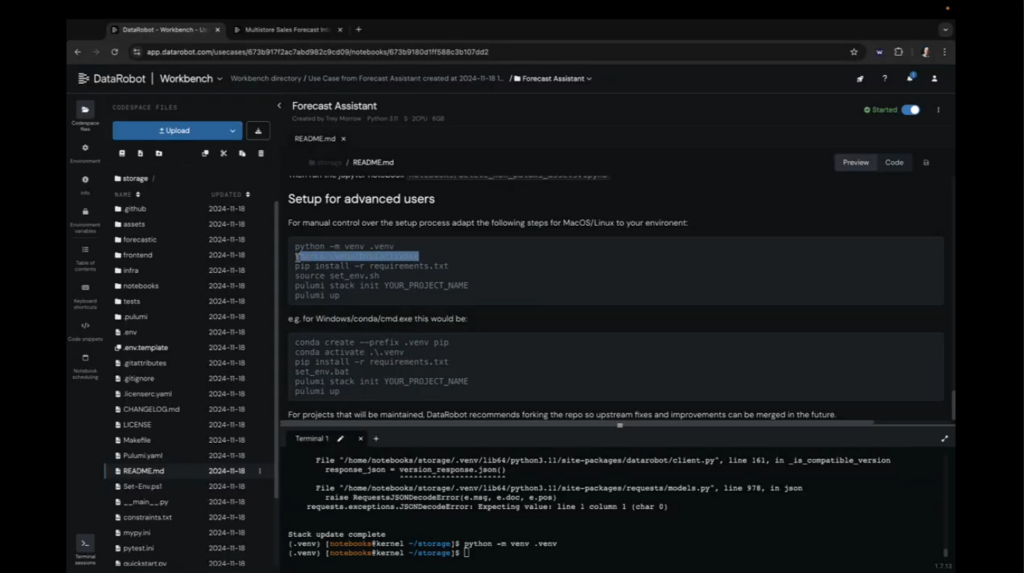
One-click SAP ecosystem embedding
Integrating AI models into existing ecosystems presents multiple challenges, including compatibility issues, siloed data, and complex configurations. DataRobot’s one-click integration with SAP Datasphere and AI Core simplifies this process by enabling you to:
- Seamlessly connect with minimal effort.
- Specify SAP credentials and compute resources.
- Bring models closer to your data for faster, more efficient scoring.
- Monitor deployments directly within DataRobot.
This integration minimizes latency, streamlines workflows, and enhances scalability, allowing your AI solutions to operate seamlessly at an enterprise scale.
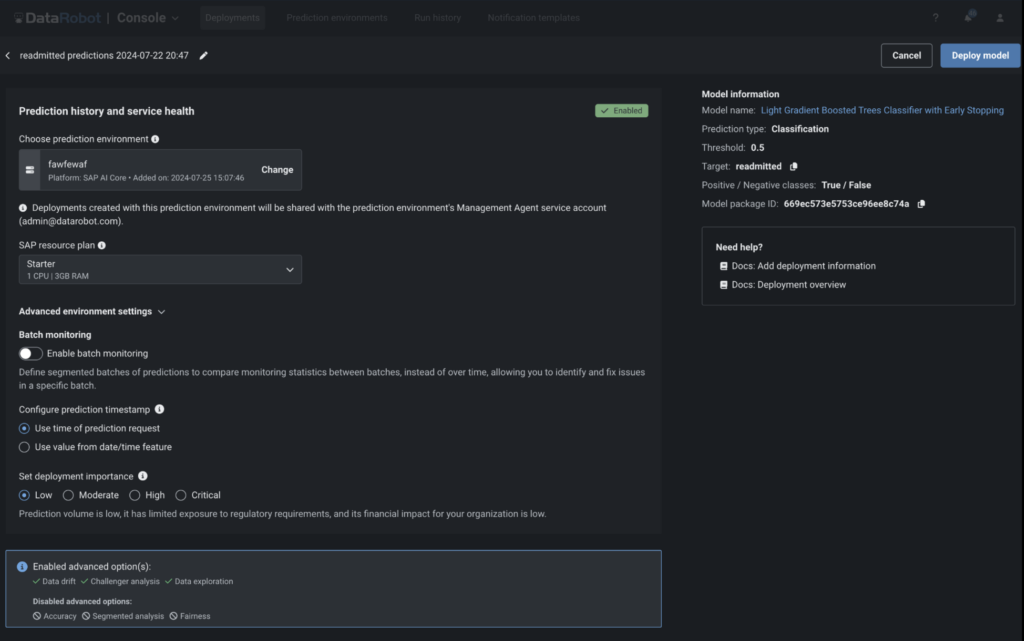
Transform your workflows with adaptable AI
Integrating AI shouldn’t disrupt your workflows—it should enhance them.
Imagine AI that adapts to your business: flexible, customizable, and seamlessly deployable. With the right tools, you can overcome challenges, deliver value faster, and ensure AI becomes an enabler, not an obstacle.
As you evaluate AI for your organization, the right AI apps and agents can help you focus on what truly matters. Explore what’s possible with AI apps that help you achieve enterprise AI at scale.
The post AI apps and agents that scale impact across your business appeared first on DataRobot.